
26 Aug 10 Questions Patients Have about Recovery after Chin Surgery (Genioplasty)
What to Expect During Your Chin Surgery Recovery
Chin surgery, also known as Genioplasty, is a cosmetic procedure designed to reshape the chin. While the surgery itself is relatively straightforward, many patients have questions and concerns about the recovery process. As a specialist plastic surgeon in Perth, Dr. Guy Watts understands the importance of educating patients about what to expect during their recovery journey. In this blog post, Dr. Watts will address ten of the most common questions patients have about recovering from chin surgery.
Take our quiz, and find out if you are ready for surgery
1. How long does the recovery process take after chin surgery?
The recovery process after chin surgery varies from patient to patient, but most people can expect to take around two weeks off work or school to allow for initial healing. Swelling and bruising are most prominent during the first week, gradually subsiding over the following weeks. While you may feel well enough to return to light activities after a week, it’s essential to avoid strenuous exercise and contact sports for at least four to six weeks. Dr. Guy Watts will provide personalised guidance based on your individual progress and healing rate. Most patients see a noticeable changes within a month, with final results becoming apparent after three to six months as residual swelling diminishes. It’s important to remain patient and follow Dr. Watts’ post-operative instructions to optimise recovery.
2. What kind of pain and discomfort can I expect?
After chin surgery, it’s normal to experience some pain, discomfort, and tightness in the treated area. The level of discomfort varies among individuals. In the first few days following surgery, you may experience a feeling of pressure or mild to moderate pain, particularly when talking, smiling, or chewing. Dr. Guy Watts will prescribe appropriate pain relief medication to help you stay comfortable during this initial period. As the healing progresses, discomfort typically subsides, and most patients switch to over-the-counter pain relievers within a week. It’s essential to take medication as directed and contact Dr. Watts if you experience severe or unusual pain that doesn’t respond to the prescribed treatment.
In addition to medication, applying cold compresses and keeping your head elevated can help manage pain and swelling. Remember that everyone’s pain threshold is different, and Dr. Watts and his team are available to address any concerns you may have throughout your recovery.
3. How can I manage swelling and bruising?
Swelling and bruising are common side effects of chin surgery, and they can be most noticeable during the first week of recovery. To reduce these effects, Dr. Guy Watts recommends several strategies:
- Apply cold compresses or ice packs to the treated area for the first 48 to 72 hours, as directed by Dr. Watts. This helps manage swelling and provides comfort. Be sure to wrap the ice pack in a thin towel to protect your skin.
- Keep your head elevated, even while sleeping, to promote better circulation and reduce fluid retention. You can use extra pillows or a foam wedge to maintain a slightly upright position.
- Avoid activities that increase blood flow to the face, such as bending down, exercising, or consuming alcohol, as these can exacerbate swelling.
If you need to camouflage bruising for social situations, you can use makeup once Dr. Watts confirms it’s safe to do so. Most swelling and bruising resolve within two to three weeks, but some residual effects may persist for several more weeks. Stay patient and follow Dr. Watts’ guidance for optimal results.
4. When can I return to work or school?
The timing of your return to work or school after chin surgery depends on several factors, including the type of job you do or your studies, your individual healing progress, and your comfort level. Most patients take around one to two weeks off to allow for initial recovery and to avoid unnecessary strain or stress on the surgical site. If your job involves low levels of physical activity and you feel well enough, you may be able to return to work sooner, particularly if you can work from home. However, if your occupation requires strenuous activity or frequent face-to-face interactions, you may need additional time off. Similarly, students may need to arrange for accommodations or extensions on assignments to assist with a stress-free recovery. Dr. Guy Watts will assess your progress during follow-up appointments and provide personalised recommendations based on your unique circumstances. It’s essential to listen to your body and not push yourself too hard, as this can prolong the healing process. When you do return to work or school, be prepared for some initial discomfort and take breaks as needed to rest and manage any residual swelling or pain.
5. What dietary restrictions will I have?
After chin surgery, you will need to adhere to certain dietary restrictions to support proper healing and to avoid complications. During the first few days, Dr. Guy Watts recommends sticking to a soft food diet, as chewing can be uncomfortable and may cause additional swelling.
Opt for foods like smoothies, yoghurt, pureed soups, scrambled eggs, and mashed potatoes. Avoid foods that are hard, crunchy, or chewy, as these can put unnecessary pressure on your incisions and cause discomfort. As your recovery progresses, you can gradually reintroduce more solid foods, but continue to avoid hard or chewy items until Dr. Watts gives you the go-ahead. It’s also important to stay hydrated by drinking plenty of water and avoiding alcohol and caffeine, which can dehydrate you and impede healing.
Maintaining a balanced, nutritious diet rich in vitamins and minerals can help support your body’s healing process. If you have any specific dietary concerns or restrictions, discuss them with Dr. Watts before your surgery to assist him in devising a proper post-operative nutrition plan.

6. How do I care for the incision site?
Proper care of your incision site is important to control the risk of infection and support optimal healing. Dr. Guy Watts will provide you with detailed instructions on how to clean and care for your incisions. Typically, you’ll need to keep the area clean and dry, changing any dressings or bandages as directed. When cleaning the incision, use a gentle, fragrance-free cleanser and lukewarm water, gently patting the area dry with a clean towel. Avoid rubbing or scrubbing the incision, as this can cause irritation and disrupt the healing process. Monitor the incision site for signs of infection, such as increased redness, swelling, discharge, or fever, and report any concerns to Dr. Watts immediately.
As your incisions heal, they may feel itchy or tight. Resist the urge to scratch or pick at the area, as this can introduce bacteria and lead to infection or scarring. If you experience significant discomfort, contact Dr. Watts for guidance.
7. When can I resume exercise and physical activities?
Resuming exercise and physical activities after chin surgery requires a gradual approach to support proper healing and to avoid complications. In the first two weeks after surgery, it’s important to limit physical activity and focus on rest and recovery. Light walking can help promote circulation and prevent blood clots, but you should avoid any strenuous activities that could raise your blood pressure or cause excessive facial movements.
After the initial two weeks, Dr. Guy Watts will assess your progress and provide guidance on slowly reintroducing exercise into your routine. Low-impact activities like gentle yoga, stretching, or walking on a flat surface may be permitted, but it’s important to listen to your body and stop if you experience pain or discomfort. As you continue to heal, you can gradually increase the intensity of your workouts, but avoid contact sports, heavy lifting, or high-impact exercises for at least four to six weeks, or until Dr. Watts gives you the all-clear.
Remember, everyone heals at a different pace, so don’t compare your progress to others or push yourself too hard.
8. What are the potential complications to be aware of?
As with any surgical procedure, chin surgery carries some risks and potential complications. While these are uncommon, it’s essential to be aware of them and know when to seek medical attention. Some possible complications include infection, bleeding, nerve damage, and adverse reactions to anaesthesia.
Signs of infection may include fever, increasing pain, redness, swelling, or discharge from the incision site. If you experience any of these symptoms, contact Dr. Guy Watts immediately for guidance and treatment.
Bleeding and haematoma (a collection of blood under the skin) can also occur, causing pain, swelling, and discolouration. In most cases, these issues resolve on their own, but severe cases may require additional treatment.
Nerve damage, although uncommon, can cause temporary or permanent numbness, tingling, or altered sensation in the chin, lips, or surrounding areas. If you experience any unusual sensations or persistent numbness, inform Dr. Watts during your follow-up appointments.
Rarely, some patients may have an adverse reaction to the anaesthesia used during surgery, which can cause nausea, vomiting, or difficulty breathing.
Dr. Watts and his team are trained to handle these situations and will monitor you closely during and after the procedure.
9. How can I maintain my results over time?
Maintaining the results of your chin surgery requires a commitment to a healthy lifestyle and following Dr. Guy Watts’ post-operative instructions. While the changes made during surgery are permanent, factors like ageing, weight fluctuations, and sun exposure can affect the appearance of your chin over time.
To keep your results looking optimal, maintain a stable, healthy weight through a balanced diet and regular exercise. Rapid weight changes can cause the skin around your chin to stretch or become lax, altering the contours achieved through surgery. Protect your skin from sun damage by applying a broad-spectrum sunscreen daily, wearing protective clothing, and limiting your time in direct sunlight. Sun damage can accelerate the ageing process and cause premature wrinkles or skin laxity.
In addition, follow a consistent skincare routine to keep your skin healthy and hydrated. If you smoke, it’s essential to quit, as smoking can impair healing, increase the risk of complications, and contribute to premature ageing.
10. What support is available during my recovery?
Dr. Guy Watts and his team are dedicated to providing comprehensive support throughout your chin surgery experience, from initial consultation to full recovery. Before your surgery, Dr. Watts will discuss the procedure in detail, answering any questions you may have and providing pre-operative instructions to help you prepare.
Immediately after your surgery, you will receive post-operative care and guidance from Dr. Watts and his nursing staff, who will monitor your initial recovery and make sure you are comfortable. As you heal, you will have follow-up appointments with Dr. Watts to assess your progress, address any concerns, and provide personalised guidance on your recovery. If you experience any issues or have questions between appointments, Dr. Watts and his team are available to offer support and advice.
In addition to the support provided by Dr. Watts and his staff, you may also find it helpful to connect with other patients who have undergone chin surgery. Online forums, support groups, and social media communities can provide a platform to share experiences, ask questions, and find encouragement during your recovery.
Further Reading about Face Surgery with Perth Specialist Plastic Surgeon Dr. Guy Watts
- Read Dr. Guy Watts’ Blog about Options for an Overly Prominent Chin
- Read Dr. Guy Watts’ Blog about What are Hooded Upper Eyelids? – Causes & Solutions
- Read Dr. Guy Watts’ Blog about Recovery after Neck Lift
- Read Dr. Guy Watts’ Blog about Receding Chin – What Is It, Causes and Options
- Read Dr. Guy Watts’ Blog about What Is Chin Ptosis? – Options for a Double Chin
Medical References about Recovery after Chin Surgery
About Dr. Guy Watts – MED0001539378
FRACS (Plas) – Specialist Plastic Surgeon In Perth WA
Dr. Guy Watts is a Specialist Plastic Surgeon (AHPRA MED0001539378) with an extensive career that spans across renowned plastic surgery clinics worldwide. His experience has been honed through invaluable experiences at esteemed establishments such as the New York Eye and Ear Infirmary and the renowned Pitanguy Clinic in Brazil.
Having collaborated with the foremost cosmetic plastic surgeons on a global scale, Dr. Watts has chosen to return to Perth after a 17-year journey of intensive training and invaluable professional experience to bring the latest practices and technology in cosmetic plastic surgery to his patients.
Dr. Watts is a Fellow of the Royal Australasian College of Surgeons (FRACS) and a Member of the Australian Society of Plastic Surgeons (ASPS), Australasian Society of Aesthetic Plastic Surgeons (ASAPS) and the International Society of Aesthetic Plastic Surgeons (ISAPS).
Read about the potential Risks and Complications of Surgery
Read the Patient Information and Resources
About CLINISPA
Clinispa is Dr Watts’ bespoke medical clinic performing Cosmetic Aesthetic treatments. At Clinispa, we offer advanced clinical treatments in a luxurious and calming environment, tailored to support your skin’s health and appearance.
Clinispa aesthetic services are performed by Dr Guy Watts’ nursing professionals, who have a passion for and solid understanding of facial aesthetics.
All Clinispa clients are considered individually, with a personalised treatment plan consisting of advanced scientific approaches to cosmetic aesthetics. We incorporate innovative technologies in conjunction with superiorly formulated skin care.
For more information about the full range of Clinispa Aesthetic of Cosmetic Treatments visit the Clinispa website








Sorry, the comment form is closed at this time.